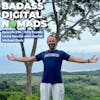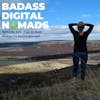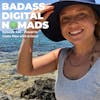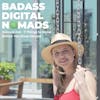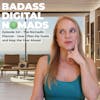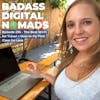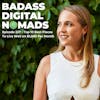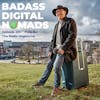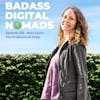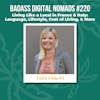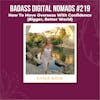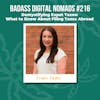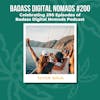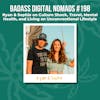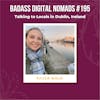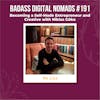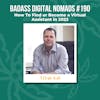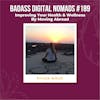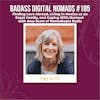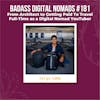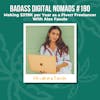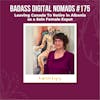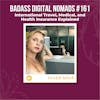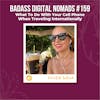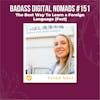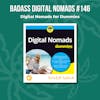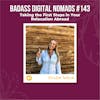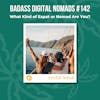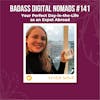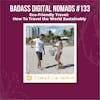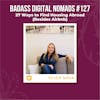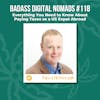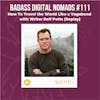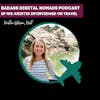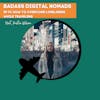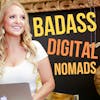10 Tips for Writing Your First Book
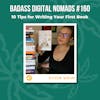
Have you ever thought about writing a book? Kristin provides ten tips, insights, and reflections gained from writing her first book. She also discusses self-publishing versus traditional publishing and provides helpful resources for writing your first book.
Have you ever thought about writing a book? Kristin provides ten tips, insights, and reflections gained from writing her first book. She also discusses self-publishing versus traditional publishing and provides helpful resources for writing your first book.
Episode 160 Special Offers:
Recommended Books:
- On Writing by Stephen King
- On Writing Well by William Zinsser
- Right to Write by Julia Cameron
- The Book in a Box Method by Tucker Max
Related Badass Digital Nomads Podcast Episodes:
Resources Mentioned:
Recommended Podcasts to Check Out:
Writers to Follow for Inspiration:
- Cal Newport
- Robert Greene
- Ryan Holiday
- Stephen Pressfield
- Tim Ferriss
- Tucker Max
...........................................................................................
Connect with Kristin:
- Follow on Instagram
- Subscribe to Traveling with Kristin on YouTube
- Subscribe to Digital Nomad TV on YouTube
- Join the Badass Digital Nomads Facebook Group
...........................................................................................
Support the Badass Digital Nomads Podcast:
- Buy Kristin a Coffee
- Become a Patron
- Leave a 5-Star Review
- Buy Official Merch
- www.badassdigitalnomads.com
...........................................................................................
A special thank you to Kristin's Patrons!
Warm welcome to new patrons, Em Winn, Daniel Sullivan, and Dion!
Become a Patron for $5/month at Patreon.com/travelingwithkristin
...........................................................................................
Podcast descriptions may contain affiliate links of products and services we use and recommend at no additional cost to you.
Sneak Peek:
Kristin: 00:00:00 Professional writers know that you can't wait for inspiration. You just have to write.
Introduction: Welcome to Badass Digital Nomads, where we're pushing the boundaries of remote work and travel, all while staying grounded with a little bit of old school philosophy, self-development, and business advice from our guests.
Kristin Wilson, Host: 00:00:26 Hey there, Kristin, from Traveling with Kristin here and welcome to episode 160 of Badass Digital Nomads. As many of you know, I recently wrote my first book and I made a post in the Badass to Digital Nomads Facebook group to see if anyone would like to know about the book writing process or some general tips for writing your first book. And 78% of people said yes, they would like to have a podcast on this topic. So the majority rules <laugh>, you're at Badass Digital Nomads, and if you wanna vote in any of the polls or just comment and hang out with the Badass Digital Nomads community, then join us in the Badass Digital Nomads Facebook group with nearly 6,000 people in it. Amazing. And so I wanted to just do this episode about some reflections and things that I learned while writing my first book because writing a book is really hard and there were so many times that I just kind of wished that I had some more information on the process and someone to turn to, to ask for tips and advice.
Kristin: 00:01:45 And so I found myself searching a lot online for resources and asking around just for help, getting through different phases of writing the book. And I strongly believe that if you've ever had the idea to write a book, then maybe that's something that you should do. But whether you want to write a book or not, I hope that this podcast is helpful and insightful into some of the lessons and learnings and realizations that I had during the process and maybe there's some nuggets of wisdom that you can apply in your own life. I also wanted to share the good news with you that I found out this week that the book is currently ranked number one on Amazon in the business travel releases. And that's all because of you. I've only announced the book here on the podcast and to my email subscribers and I've also posted about it on my YouTube community page, but it seems like you guys, the badass digital nomads listeners have propelled Digital Nomads for Dummies to number one on the Amazon business travel book list.
Kristin: 00:03:03 So that is just incredible news and I'm so grateful to all of you for the support. And someone even told me yesterday that they saw the book trending in like the top 12 or top 20 of of new releases on Amazon. So that is pretty cool as well. Before we hop into today's topic, I just wanted to say Happy Father's Day to all of the dads out there. I was talking, um, with my dad this week and he was just here recently for the Formula One Grand Prix, and that was really fun to hang out with him. My dad drives race cars or he always has, he's always been like a car guy. And so that was fun to go to that race together. And one of the things that we were talking about that came back to mind this weekend is just really how fortunate we are to live at this time of history in the world, just in general.
Kristin: 00:04:01 And I think that's something that I think about a lot when I travel, learning about different cultures and learning about the history of different countries. And it's something that I talked with my dad about on the phone this week. And then also on Saturday I was playing a DJ set on a rooftop bar in Miami at Sunset with a view of the city and just literally pinching myself. Like, here I am playing deep house music at sunset on a rooftop and this is so cool. It was so much fun. And the the friends that came to see me were people who I've only met in the past year living in Miami. And after my set, we went downstairs and ate pizza. And I realized at the table that we were all from different countries. I was the only one from the US. There was a guy from Turkey there, from Bolivia, from Scotland, from Argentina and from Chile.
Kristin: 00:05:05 And we were just having this family dinner sharing pizza all from different corners of the world. And I was just thinking of how fortunate we are to live at a time where we can do that. We can just sit down to eat a meal with people from all different countries. And whether you're in your hometown or whether you're traveling, we have so much freedom of movement and just freedom in general. And now, not everybody of course, but you know, for the most part to be here in 2022 versus a hundred years ago, things have definitely changed a lot. So that's just something that's been on my mind this week, something that I've been really grateful for and and reflecting on and just wanted to share that with you because sometimes, you know, life has its ups and downs and sometimes you have a bad day, but it's, it's always good to get a bird's eye perspective and kind of pull back and, and reflect on some of the good things and things that you're grateful for, even if you wake up on the wrong side of the bed one day or are just having not the best day.
Kristin: 00:06:16 As I was just recording this, my friend Marco texted me, he's from Italy and I met him in Las Vegas and he's a writer as well. And he gave me a lot of tips and help while I was writing my book and also very grateful for him. It's funny how you know how you meet people. So serendipitously we met in 2011 and here he is 10 years later helping me with my first book. So let's talk about tips for writing your first book. I'll go through 10 tips here on the podcast and then I'll leave the resources for the end. So I'll give those to you all in a list. And then you can also check the show notes for more. So the first thing to think about is that if you think you should write a book or if you've always said like, oh, I should write a book about that, or if you've always wanted to write a book, then I think that you probably should.
Kristin: 00:07:15 One of the things I noticed is that I always wanted to write a book on all different topics, and that desire has never gone away. It's changed a bit as far as the type of book that I wanted to write, the topics I've wanted to write about, but I've always wanted to write books and I never finished one until now. Um, so if, if that sounds like you, if you've always had a lot of ideas for books but never wrote them or never finished them, then I would encourage you to just pick one and work on it and, and finish it and be okay with the fact that it might not even be good. Like the first anything that you make, it's just practice. And um, sometimes, you know, we think as adults that we have to get it right the first time or that we have to be, you know, really good at everything and, and that can sometimes hold you back from even taking that first step.
Kristin: 00:08:05 But we are so lucky, again, going back to what I was talking about at the beginning. These days there are so many opportunities and methods for writing a book. You don't even actually have to be a good writer and you don't even have to write your book. You can even dictate your book. There are services now that will help you write your book where you can just record yourself talking about the topics that you know about and that you wanna write about. And then editors and other writers will help, uh, organize those words for you or clean them up for you. I think back to people carving records into stone tablets or writing with a feather pen and ink. And then these days we have eBooks and audiobooks and self-publishing and even the plight of finding a publisher to publish your book and convincing someone that your book is worth publishing.
Kristin: 00:09:03 There's now self-publishing. There's Amazon, Kindle Direct publishing, there's indie publishing options, there's so many options for normal people to be able to get their books out there. So my first tip for you is just if you think you can do it or if you want to do it, to take that first step and look deeper into it because otherwise it can become one of those things where you always think that you could write a book or that you should have written a book, but then you never start. And so my first tip is to just, um, explore that possibility and, and look realistically at how you could write your first book, even if you're not technically writing it. The second thing to think about is what kind of book do you want to write? Is it a fiction book? Is it a non-fiction book? Is it a memoir?
Kristin: 00:09:56 Is it a business book? Is it a how-to book? Like what is the book that wants to be written by you? Because there's all different sorts of categories of books and so sometimes it can just kind of be this thing of like, I wanna write a book, but start to get specific over, okay, if you were to write a book, what type of book would you write? What would the topic be? What would your book be about? What would, what's the purpose of the book? Is it to entertain? Is it to create a guide? Is it to inform, is it to tell a story? Is it to tell your story? Um, just think about what your book would be about. And then the third thing to consider, which I've already talked about a little bit, is how would you publish your book? Would you want to self-publish it?
Kristin: 00:10:47 Would you want to find a publisher? And that is, that is based on what type of book it is and what the market is for the book and also what your area of expertise is, and if that is related to the topic of the book and also for your purpose of writing the book. Um, not everybody needs to have a publisher, but you could always self-publish. You could do the indie publishing route. And again, at the end of the podcast we'll give you a list of more in-depth resources of how to figure out if you should self-publish or find a publisher and what the pros and cons are of that. But it's important to think about that at the beginning and you know, your purposes for writing the book and who's going to read it, where are they going to buy it? Is it something that they're going to find in a bookstore or is it something that they're just gonna get online?
Kristin: 00:11:43 Uh, it also affects how much you could earn with the book. You get to keep more of the money if you self-publish, but you also, but you also cover the costs of producing the book and finding editors and designers for the cover illustrators, things like that. A lot of people also crowdfund their books. And so that's definitely an option. It's also a good way to test the idea for your book. So if you wanna write a book but you wanna have some public accountability and you wanna make sure that people would be interested in reading your book, then check out some of the, uh, crowdfunding websites and look at some examples there. The next thing I would recommend, the fourth tip before starting anything of writing the book or a rough draft, is to write a book proposal. It's kind of like when you're starting a business, you write a business plan.
Kristin: 00:12:41 I think it's really important to write a book proposal and it's something that I didn't consider doing when I was going to self-publish my book. I only did it when I was presenting the book to a publisher and it was a difficult and challenging experience to write a good book proposal. And I sent it to editors and people to give me feedback on it before I got to a final version of it, just as you would with a blog post or a manuscript. But I think it's really important because it forces you to think through every aspect of your book. It it forces you to work through the topic. You don't necessarily have to have a title. I think even the title of the book could come very late in the process or even at the very end. But the idea behind your book, the purpose of the book, the audience of the book, and the the person that you're writing the book for, when you spend time thinking these things through at the beginning and writing out your proposal for the book, I think it makes a better book in the end because it gives you a lot of organization and a sense of direction for, uh, where the book is going and how to develop the table of contents, which I'll talk about next.
Kristin: 00:14:06 Another element of the book proposal is the marketing and sales element. So this is thinking about which sales channels you would use to sell the book, what the audience size is, what marketing methods you would use, and what your sales strategy is in general. And if you're writing a book proposal for a publisher, it's going to be slightly different than if you're writing a book proposal to yourself to be self-publishing the book because a book proposal with a publisher is geared towards, you know, where is that book going to be on the bookshelves in bookstores, like what category is the book in? And it's looking at it from the publishers and the retail perspective, whereas a book proposal for yourself, just for organizational purposes and for strategic planning purposes, um, can be more focused on, you know, the individual reader. And again, I'll give you some tips on where to get step by step information on how to write your book proposal at the end.
Kristin: 00:15:15 Writing a book proposal itself kind of feels like you're in school, at least I felt like I was in college again writing a term paper. But it definitely helped and I would recommend it to everyone. The fifth tip, and this would be included in your book proposal, but it's also a separate standalone element, is writing a very detailed table of contents. Writing a book is very hard, but if you write a detailed table of contents at the beginning, that's almost the hardest part. There's a lot of hard parts throughout the process, but writing that table of contents gives you a structure for the book and you can always change it later. You, you likely will change it later and you'll reorganize and rearrange things. But the more comprehensive and detailed you make your table of contents and what you want to include in the book, the easier it will be to write those sections.
Kristin: 00:16:23 So when you think of just putting something like write a book on your to-do list, that's very difficult. But if someone gave you one topic to talk about in your area of expertise, you could definitely do that. And there's even a strategy for writing a book through blogging. So if you wanna search online like Google writing a book with blog posts, people will actually break their table of contents down into basically different blog posts. So you can even have one section or one chapter be a blog post, and then you can have like subtopics within that chapter be smaller articles or they can be elements of one blog post. And you can use these long form blog posts that are all related to the same topic and structure them in the order that they would make the most sense as the table of contents of a book.
Kristin: 00:17:24 And I really like that approach depending on the type of book it is that you're writing, because a blog post is much shorter than a book and it's also less intimidating than writing a chapter of a book. And then once you have a solid table of contents, you should be able to look at it and think about, you know, could you write this book as is or would you need to do any more research? Some of the authors that I follow, like Robert Green and Ryan Holliday, they might read hundreds of books in preparation to write one book. And they have this note card system that Robert taught to Ryan actually where they take notes from the books that they're reading as research for the book that they're writing and they organize that in a way that they then use when they are putting together their manuscript.
Kristin: 00:18:23 So if you get to that step and you realize that there's a lot more research that you need to do, that will affect the next tip, which is about creating a writing schedule. So if you get to the phase where you've thought through your book, you've written this book proposal, you've written the table of contents, you should come to a point where you either know if you can start writing or if you need to do some more reading and research and then set a start date and a schedule based on that. So I've noticed that Ryan Holliday will do his reading and research and then he will take some time off and then start the book. So he kind of gives himself a little break, like a respite and a pause leading up to this start date where he will get to work with writing his book and then he will have a writing schedule that he sticks to until the book is done.
Kristin: 00:19:22 And I don't know if it's five days a week or seven days a week, but I've heard a lot of writers, I've been listening to a lot of other podcasts and a lot of writers just swear by having a writing schedule. Steven Pressfield talks about this as well. He talks about being a professional versus an amateur and how many new writers think that they need to be inspired to write. But professional writers know that you can't wait for inspiration, you just have to write and you just have to trudge through even when you feel like you don't feel like it, even when you feel like you're not making progress, even when you feel stuck, when you feel confused, when you feel frustrated, you just have to show up at the page every day and do your writing for that day. Tim Ferris and Ryan Holliday say two crappy pages per day, depending on what your book is about, how long it is and how long it will take to write and what you can realistically do per day, that will depend on what your writing schedule looks like.
Kristin: 00:20:31 My deadline was pretty tight compared to most books, so I had a lot of writing to do each day. But Tucker Max from Scribe Book School, he recommends starting out with just 20 minutes per day, 20 or 30 minutes per day. And a lot of people can do that. You know, I'm sure we all waste at least 20 or 30 minutes a day either on social media or the news or something like that. So it's just about setting a, an amount of time that you feel is realistic that you can stick to. Don't put something like 3000 words per day or three hours per day because that's just not gonna be realistic every day. And then if you miss a day or you miss multiple days, then you might lose motivation. But it's important to set a start date for when you're going to start writing a writing schedule of how long you'll write per day.
Kristin: 00:21:31 And it's also really helpful to put where you will write or when you will write. Research shows that habits are easier to stick to when you're very specific and precise about them. So will that writing happen in the morning? Will it happen on your lunch break? Will it happen at night? Part of it depends on what your job is when you have free time and also when your best attention hours are. For me, I like to write in the morning, not too early, but starting around like 9:30 or 10:00 AM until about 12:00 PM those are my best hours for writing, but it's gonna be different for everyone. Tucker Max gave an example of this guy who used to sit for 20 minutes in his Tesla when it was charging in the garage and he would just only write when his Tesla was charging every day.
Kristin: 00:22:28 So, you know, for me it was writing in the library and then I eventually got a co-working space, uh, for you. You know, it might be writing at a coffee shop, it might be writing at your kitchen table, like just picking a time and a place is really helpful and an amount of time. And then also setting a deadline so you can kind of work backwards, like looking at your table of contents, how long you think your book should be and when you wanna have your book published by. You can calculate how many words you can write per day. So you can give yourself a time limit, like 20 or 30 minutes per day, or you can give yourself a word count number, like 250 words per day or 500 words per day. And then you can just multiply that out to find out how long it will take you to write your book, depending on if your book is like 30,000 words or longer.
Kristin: 00:23:22 But I think it's also really helpful to have a deadline. Like when I was going to self-publish my book, I didn't have a deadline and that book never got finished working with a publisher, obviously I had a deadline and the book was done. So setting a deadline and maybe having an accountability partner is also really helpful. But I think just having a realistic writing goal that you can stick to that is the battle and the time's going to pass by anyway. So even if it takes you a year or more to write your book, like if you just do a little bit every day, it'll be done before you know it. And other authors I've talked to, like some of them have spent a year and a half or even three years writing one book because they just did a little bit at a time and they just went slower.
Kristin: 00:24:15 But Parkinson's law says a task expands to fill the time allotted for its completion. And that is very true with anything, but especially with writing. The seventh step you would think would be to start writing. You know, you have your writing schedule, you have your book proposal, you know what your book's about, you know where you wanna publish it. So you just start writing write, well, here's one more, more step I would like to recommend, and that would be to unblock yourself. Writing a book is hard. Writing a book is scary. There's a lot of subconscious fears that you might have about writing your book as well. And so I think before you start writing, it's really helpful to write down all of the things that you're afraid of that could happen if you write your book. When it comes to unblocking yourself or getting over the fear of doing something, there are a lot of different ways to approach it.
Kristin: 00:25:13 There's this stoic fear setting exercise that Tim Ferris really likes and Ryan Holliday, where you just write about all of the things that could happen and then how you would address those logically. So your ego and your subconscious might harbor these irrational fears because it's trying to protect you. And so you just need to get those out in the open and then dismantle them and say, okay, you know, like what's the worst case scenario that if I write this book and I will look like a fraud or I will look stupid or my career will fall apart. Like all of these irrational fears that come up, you just write them down and then you write down what you would do if that actually happened. And then of course none of them usually happen at all, but that's just a way for urological brain to overcome those fears.
Kristin: 00:26:14 Julia Cameron, who's the author of The Artist's Way, she has a great exercise called Blasting through Blocks. And she says, in order to work freely on a project, an artist must be at least functionally free of resentment, anger, and resistance or fear. And, and she says that beginning any new artistic or creative project, it's a good idea to ask yourself a few simple questions to help remove any blocks between you and the work at hand. And it's just four questions so you can find out more in her book The Artist's Way, but she recommends to first list any resentments you have in connection with the project and then you list any fears about the project. She gives some examples like, I'm afraid the work will be rotten and I won't know it. I'm the, I'm afraid the work will be good and they won't know it.
Kristin: 00:27:17 I'm afraid I'll never start. I'm afraid I'll never finish. I'm afraid I'll be embarrassed, et cetera, et cetera. And then after you write down everything you can think of, you just ask yourself, is that all? Have you left out any fears or suppressed any silly angers about the project? Get it down on the page. And then you ask yourself what you would stand to gain by not doing the work. So she says, if you don't write the piece, then no one can hate it. Or if you don't, she gives other examples, not just writing, but if you don't paint or sculpt or act or sing or dance, then you can criticize others knowing that you could do better if you did the work. So you just ask yourself, you know, what do you stand to gain by procrastinating basically is what she's saying here. And um, you know, you could feel more comfortable, you could feel safer and more secure, you could feel less exposed to criticism.
Kristin: 00:28:19 There's all sorts of hidden payoffs that your brain can come up with to not doing something that you know you want to do or that you know you should do. So the basic premise here is just to unblock yourself. Because even if you don't think that you have any fears around starting a big project, there's probably something there but you don't know unless you ask yourself and write out the answers. The next thing to do is just start writing. Start writing, stick to your schedule and know that you're gonna have your first draft and it won't be very good. This is called the vomit draft. Don't try to edit while you write. Just write when you write without having the standard of excellence that you're, you have to write a bestseller or anything like that and you write a first draft that you know nobody's going to read except you and maybe an editor, then it makes it easier because you can just leave the problems for your future self to fix <laugh>.
Kristin: 00:29:27 It's really hard, if not impossible to write a good first draft of anything. And it's even harder to edit as you write. That's kind of the equivalent of like writing a sentence and then deleting it and starting over and you just won't build up much momentum that way. So I think one of the things that helped me the most in the writing process is just writing freely, like writing the first draft without worrying about it, without rereading it as I was writing. Like just write it, get it done. And then you can always go back, read it again, edit it a bit, and then send it to a regular editor. And then you can do as many rounds of edits as you want, but it's much easier to edit something you've already written than to just keep working with a blank page. And you're gonna find during that process that you might need to do more research or more reading.
Kristin: 00:30:27 But don't stop the writing process to do that. Just skip over any parts where you're getting stuck and come back to them later because you could end up going down some research rabbit holes where you kind of get off your writing schedule and start reading and researching and then lose that writing momentum. And then my ninth tip, which is something that I really didn't think about before I wrote a book, was how important it is to take care of yourself during this process. I know there's all these stories of writers, like especially Hemingway. I remember when I went to Cuba and to the Keys and seeing all the places that Hemingway was hanging out and drinking at bars and whatever was going on there. And you know, kind of living this crazy lifestyle. Uh, but for me it was such an introspective process that it really made me slow down and focus more on self-care and really only do the most important things that were related to the book and my other work of course.
Kristin: 00:31:39 But I started outsourcing anything that wasn't essential. So I would take my laundry to wash dry fold, for example. Like it was better for me to pay for someone else to do my laundry than to spend like four hours doing laundry when I could have been writing or I could have been resting or something like that. So I ordered a healthy meal plan delivery service, I had organic meals delivered at least two meals a day. So I really didn't have to cook that much, not through the whole entire process, but especially around the deadlines. I didn't wanna be wasting time like cooking and cleaning and doing laundry. So I had maid service come and that really, really helped. And it just gave me more time like an athlete, like more recovery time, sleeping enough, eating healthy food, you know, not living on just like coffee and nachos or something like having nourishing food in my body and like it really felt like learning Spanish, the mental exertion that it takes to learn a new language that I've talked about in other podcasts.
Kristin: 00:32:54 That's what it felt like writing a book. And I think I've mentioned on the podcast before that I originally got hooked on coffee living in Costa Rica learning Spanish because I was just, it was so mentally intensive, so many hours per day learning Spanish that I was drinking a lot of coffee there. And then I've been in love with coffee ever since. But actually with writing the book, I cut back on coffee because I just decided to sleep more, drink less coffee. And that helped me focus a bit better without ever feeling like jittery or anything. Which are some of the side effects of too much caffeine. Exercise is also really important. There's so, so many examples of writers who really rely on walking to work through the problems that they're having with their writing. Even Cal Newport, I've heard him talk about this a lot.
Kristin: 00:33:50 He actually writes in his head when he's going on walks, humans have been walking forever. So many philosophers and writers and teachers have gone out into nature to sit and think and and walk and work on problems. And this goes for anything I think, you know, walking is, is good for you in so many ways, but it also helped a lot when I was writing the book to get up and get away from the screen sometimes and just go for a walk and get in the fresh air. And Tucker Max also recommends like getting massages and going to the gym, working out. You really do need to get physical exercise and balance out for all of that, sitting and thinking. And of course this goes for anyone who's working and sitting in, in a chair all day. But I found it to be particularly helpful, uh, with the writing process.
Kristin: 00:34:53 And my 10th tip is to build a support team, bring together a group of people around you for accountability and also to help you with producing the book so your friends and family can be there for support and moral support. But you also might want to find a mentor or editors very helpful. There's a lot of different roles that come into publishing a book at each phase of the process. And there are plenty of resources and people who can help you, especially on freelancing sites in Facebook groups. If you're looking for an accountability partner or an editor or multiple different types of editors. There's like copy editors, there's technical editors, you can find people like that, um, on freelancing sites like Upwork for example, or Fiverr. But also there's a lot of groups dedicated to writing books on Facebook and you can go in there and ask people for recommendations, especially if you're going to be self-publishing cover designers as well.
Kristin: 00:36:10 But you also wanna share the book with people that you know and, and get feedback on it. I remember reading about Tim Ferris's process and writing the 4-Hour Work Week, and I was surprised by how strategic he was with that book. It was like he engineered it as a best seller. It wasn't an accident. <laugh>, and he worked on the title a lot. He sent chapters out to all of his friends. He asked people, you know, what 10% would you cut? What 10% would you keep? And you know, what 10% did you like the most? He edited line by line of the book and like ruthlessly cut things out. But you know, getting other people to look at it is really helpful. And so don't be afraid to hire someone to look at it or send it to people who are in your audience. People who would be the reader of the book.
Kristin: 00:37:12 You know, maybe I didn't send it to my mom because she's not trying to be a digital nomad <laugh>, if you send it to the wrong person, you might not get the type of feedback that you're looking for, but finding a dedicated editor designer for the book cover accountability partner, people who are going to support you and encourage you throughout the process and hold you accountable so that you don't have to go through it alone. Or even if you just wanna have someone to talk to, to work out some writing problems or just to blow off some steam one day. So those are my 10 tips for you if you are going to write your first book. And then I also have a list of resources here for you to get more detailed information on the process. So one, one of the sources that helped me the most is Tucker Max's Scribe Book School.
Kristin: 00:38:12 So Tucker Max is a New York Times bestselling author and he wrote this book, which you can probably find on PDF online called Book in A Box. And his goal was to help people who were too busy to write a book or who weren't writers to write a book. And so he created this method that anyone can follow to write their own book. And they have a lot of free resources. Like you can use Scribe Book School to write your book without hiring them to help you, but they also will help you write and publish your first book. So check them out. And they also have a podcast that's really helpful. Their content is very SEO optimized. So any question that you have about writing a book, they have a podcast and or a blog article about it. And they're on ranking on the first page of Google.
Kristin: 00:39:05 So they have things like how to write your book faster, how to tell a story in a book, how to avoid publishing scams, how to get booked on podcasts, how to write a good book proposal, which software to use to write your book. How much does it cost to publish a book. Like anything you'd wanna know, they have something on it. There's also the Self-Publishing School. So this is another company that has a lot of free resources and content online about how to publish a book, but then they also offer services to help people publish their books. I also like the Creative Pen Podcast by Joanna Penn, and that was recommended to me by one of the Badass Digital Nomads podcast listeners. So thank you for that. Another podcast is the Self-Publishing Show. And Ryan Holliday's Read to Lead Challenge is also very helpful because it talks about, it's more about reading books and not writing, but Ryan talks about his process for note taking when he reads books and then using that research to write his books for motivation.
Kristin: 00:40:21 I like interviews with Robert Green and Steven Pressfield and also Tim Ferris. So any YouTube interviews or podcast interviews on with them and their writing process I found just really motivating during the process. And then a few books that I highly recommend just for writing in general, uh, are On Writing Well by William Zinsser. I also like Stephen King's book called On Writing and Julia Cameron's book, which is called Right to Write. So R I G H T TO W R I TE. And I love that book because it just shows that everyone is a writer and everyone can be a writer. You don't need to have a degree in literature to be able to write or in communications or journalism. So take advantage of this time that we're living in where technology has made it so easy and so affordable for us to share our ideas.
Kristin: 00:41:30 I hope these tips and resources are helpful for you if you embark on this book-writing journey. And you can find a copy of my first book, Digital Nomads for Dummies, almost anywhere books are sold. It's available on Amazon, Barns and Noble, Target, Walmart, just Google Digital Nomads for Dummies. And I'll also leave some more links in the show notes. And thank you again for helping it to become the number one business travel release on Amazon right now. I've also started recording interviews again for the rest of the year. So interviews will be back on the show soon and see you again next week.



























